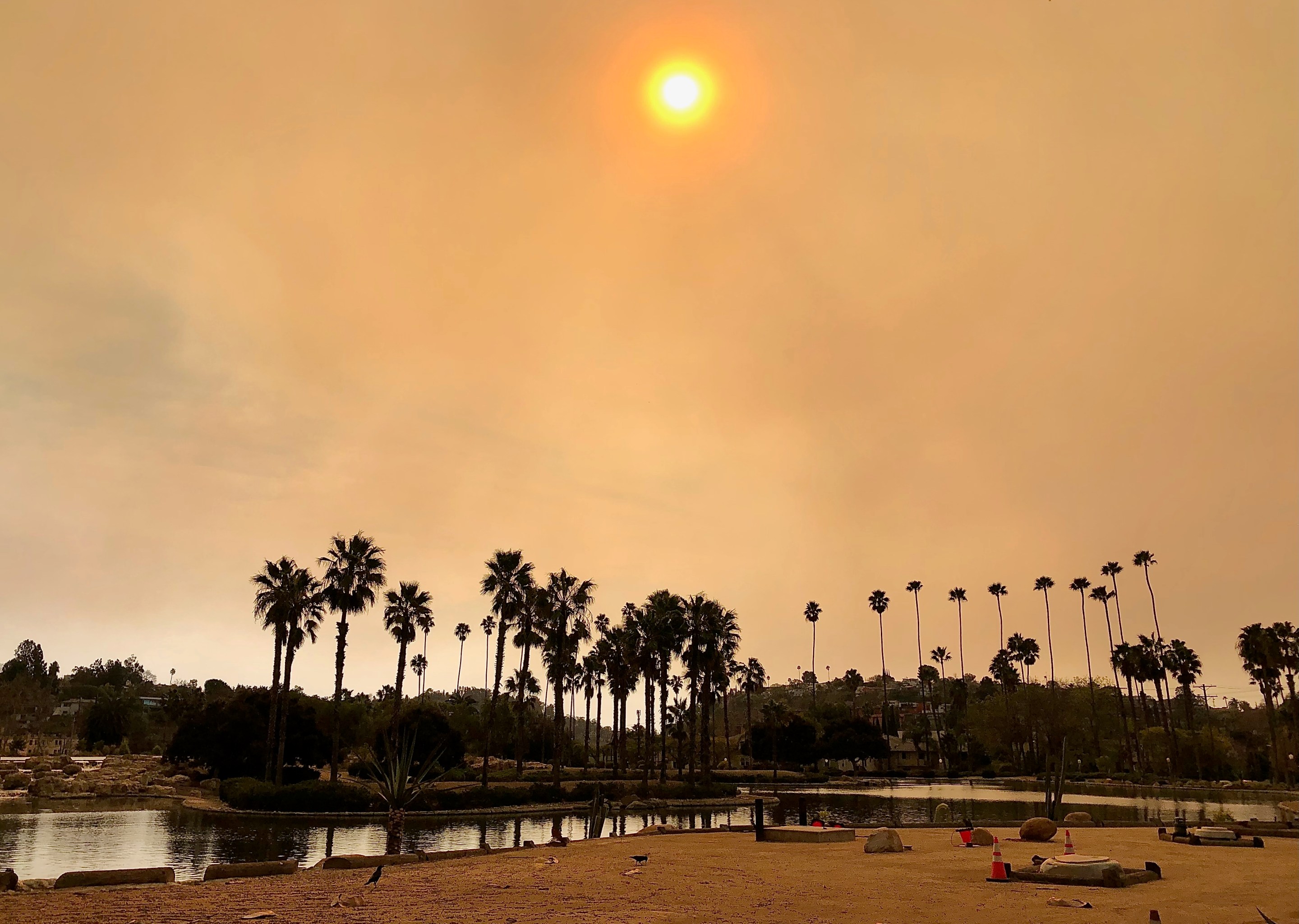As devastating fires blew up across Los Angeles last week, researchers from the Latino Policy and Politics Institute and the Center for Neighborhood Knowledge at UCLA released a data brief highlighting systemic inequities that, if not acknowledged and accounted for in the wildfire recovery efforts, could exacerbate long-standing inequalities in Latino and underserved communities across the county.
The researchers underscored that the consequences could be particularly negative for Latino communities, which disproportionately suffer from pollution, a lack of access to insurance (either medical or disaster-related) and other safety net programs, and a lack of access to critical medical care in the wake of disasters.
Outdoor workers are particularly vulnerable.

The higher concentration of Latino employment in outdoor work (construction, landscaping, vending, etc.), the researchers noted, puts them at greater risk for respiratory illnesses due to hazardous wildfire smoke.
The fact that many of these workers already reside in communities with poor air quality compounds the potential for significant harm.
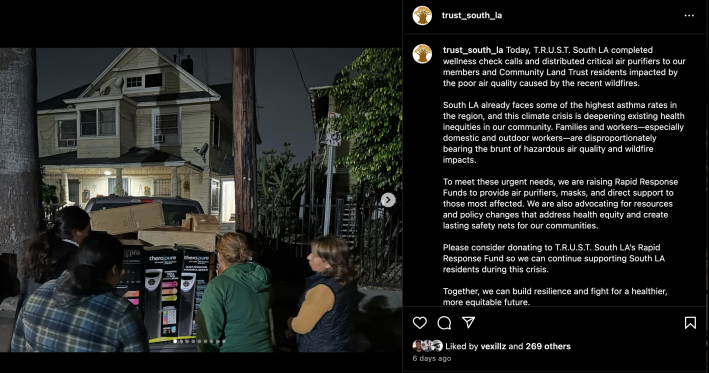
And, as is becoming increasingly clear, too many of these workers have lost their income stream after the homes they worked in and around in both the Palisades and Altadena went up in flames.
The need for these workers - and, in particular, immigrant workers who cannot access federal emergency assistance - to quickly find new sources of income is very real and very pressing.
Jornalero Armando González told Univisión reporter Enrique Rodríguez (below), he has been traveling 60 miles from Baldwin Park to San Bernardino to look for work after being unable to access the two sites he worked at in Altadena to see if they were still standing.
As alluded to by both González and the UCLA researchers, the lack of a safety net for these households can leave them scrambling.
"You need five or six days a week of work" just to stay afloat under normal circumstances, González told Rodríguez, below. And "gardeners don't just work eight hours - they work twelve." So to lose even one or two days of work, as so many have lost now - "It's a lot," he said.
For immigrant street vendors or recyclers, things may be even more dire. Street vendors are among some of the lowest-income workers, averaging around $10,000 a year. Meaning they will need to establish themselves in new spaces as soon as possible, regardless of air quality concerns.
These are the workers Boyle Heights-based nonprofit Inclusive Action for the City is attempting to help cover short-term expenses with one-time donations of $500 to qualifying applicants.
Their Open Air Worker Emergency Fund has already received over 4,000 applications, says Communications Director Erica Liepmann. That's more than two million dollars' worth of need.
As of publication, their gofundme stands at just over $146K. The additional $400,000 they've received from corporate and other nonprofit donors puts the total funds raised at over $500,000. It's enough to cover distributions to almost 1,100 people, but still potentially leaves another 3,000+ to go without.
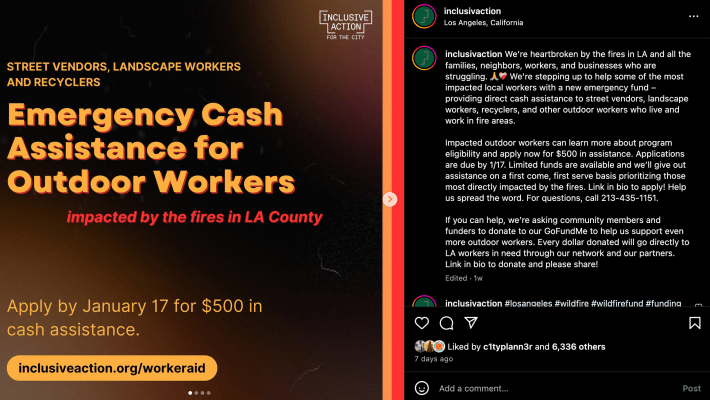
Though limited, these funds can be of significant assistance to those who cannot access official emergency funds...or are afraid to try for fear of putting a target on their own backs.
"There's just tremendous fear right now with the incoming Trump administration," says Liepmann.
With good reason.
Trump made xenophobic rhetoric and "mass deportation" a pillar of his campaign. As his inauguration approaches, his team appears to be gearing up to make good on some of those promises. Just this past Monday, Trump's chosen "border czar," Tom Homan, repeated his chilling assertion that "families can be deported together" when asked about the issue of family separation. In a chilling interview with NBC News, he also reiterated his desire to deport anyone who lacked proper documentation, regardless of whether they had committed a crime. And he acknowledged that a "hotline" citizens could use to report undocumented people they suspected of criminal activity was among several of the "fresh ideas" Trump was considering to facilitate the identification of potential deportees.
Meanwhile, over on Truth Social, Trump was busy stoking conspiracy theories that blamed immigrants for the fires.
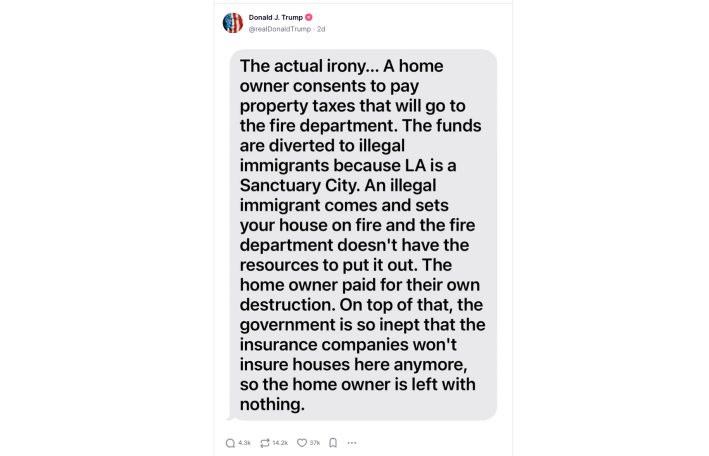
Trumps claims are inflammatory and nonsensical. (Not least because the lion's share of L.A.'s city budget goes to funding law enforcement...)
But his rhetoric was never meant to be accurate. It was meant to scare immigrants deeper into the shadows or into returning into their home countries on their own.
Yet the world has seen that immigrants were among the first to jump into action: assisting in neighborhoods as they caught on fire, returning to clean up in the aftermath of the wind and firestorms, and creating resource distribution centers for the displaced and dispossessed.
Radio Jornalera even highlighted a laborer who responded directly to Trump's Truth Social post. In it the man - who continues picking up debris to ensure fire-vulnerable communities don't burn again as he speaks - declares Trump doesn't understand either the sacrifices or the essential contributions immigrants make to this nation.
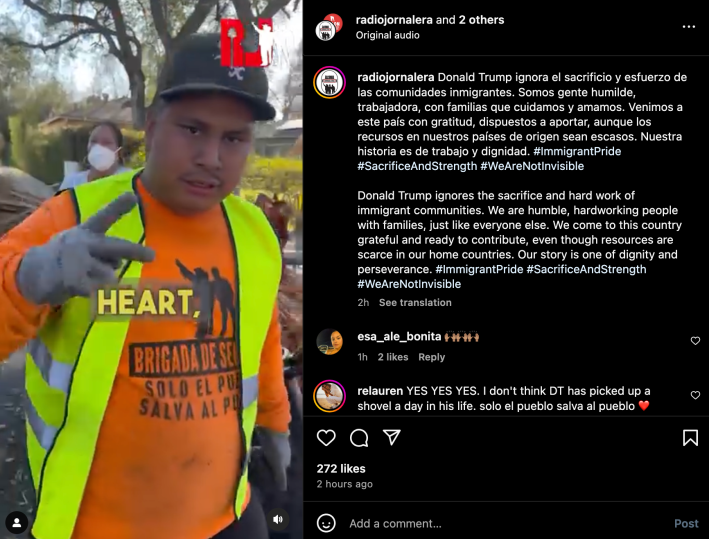
The Pasadena Community Job Center - which quickly became a hub for these efforts - is still taking donations of essentials, doing cleanup work, and updating the list of needs regularly via their instagram and those of Radio Jornalera and the National Day Laborer Network (NDLON).
Outdoor workers can apply for assistance from the Open Air Workers Fund through the end of today, January 17 (donations will continue to be accepted via gofundme). The applications can be found here in English or Spanish.
NDLON is also fundraising to assist day laborers via their Immigrant Fire Relief Fund.
